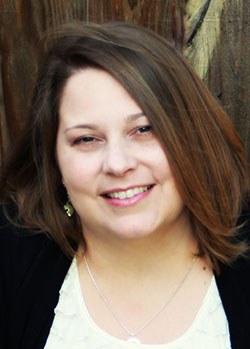Jessica Richardson, Ph.D., CCC-SLP

Professor
- Email:
- jdrichardson@unm.edu
- Phone:
- (505) 277-4453
- Interests:
- aphasia, brain injury, brain stimulation, discourse assessment, neurogenic disorders, neuroimaging, primary progressive aphasia, stroke, traumatic brain injury
- External Lab:
- Neuroscience of Rehabilitation Lab
Profile:
Jessica D. Richardson, Ph.D., CCC-SLP is an associate professor and speech-language pathologist in the Department of Speech and Hearing Sciences at The University of New Mexico. She graduated with a B.S. in Communication Sciences and Disorders (The University of Georgia) and a M.S. in Speech and Hearing Science (The University of Arizona). She then completed her Ph.D. study at The University of Georgia in the summer of 2009 and went on to complete a post-doctoral fellowship at The University of South Carolina. Her research interests include treatment outcomes and translational neuroscience, with an emphasis on adults with communication disorders following acquired brain injury.
Dr. Richardson’s research focuses on brain injury recovery and neural plasticity, the development of efficacious treatment approaches, and the development of outcome measures that better predict increased life participation post-injury. This involves several lines of research:
- Localization of cortical areas associated with speech and language.
- Administration of treatment (often with brain stimulation to cortical areas) to influence speech and language.
- Characterization of dose-response relationships for brain stimulation using eye movement data.
- Using neuroimaging to learn more about the physiological effects at the cortical level induced by brain stimulation.
- Investigation of discourse of healthy adults and persons with aphasia and development of outcome measures that better predict life participation.
- Investigation of the impact of stroke on the health status and life participation of friends and family members of persons who have had a brain injury.
Using clinically available information about the “whole patient” to predict outcomes and response to treatment.
Click here if you are interested in donating to the Neuroscience of Rehabilitation Lab!
Joint appointment with Department of Orthopaedics and Rehabilitation, Division of Physical Medicine and Rehabilitation (June 2023-June 2026)
Recent/Selected Publications:
Dalton, S.G., Cavanagh, J.F., & Richardson, J.D. (2021, March 17). Resting-state EEG (rsEEG) in chronic aphasia is reliable, sensitive, and correlates with functional behaviors. Frontiers in Human Neuroscience, section Speech and Language. https://doi.org/10.3389/fnhum.2021.624660
Richardson, J.D., Dalton, S.G., Greenslade, K.J., Jacks, A., Haley, K.L., & Adams, J. (2021). Main concept, sequencing, and story grammar analyses of Cinderella narratives in a large sample of persons with aphasia. Brain Sciences, 11, 110. https://doi.org/10.3390/brainsci11010110
Haley, K.L., Cunningham, K.T., Jacks, A., Richardson, J.D., Harmon, T., & Turkeltaub, P.E. (2020). Repeated word production is inconsistent in both aphasia and apraxia of speech. Aphasiology.https://doi.org/10.1080/02687038.2020.1727837
Spell, L.A., Richardson, J.D., Basilakos, A., Stark, B., Teklehaimanot, A., Hillis, A.B., & Fridriksson, J. (2020). Developing, implementing and improving assessment and treatment fidelity in clinical aphasia research. American Journal of Speech-Language Pathology, 29(1), 286-298. https://pubs.asha.org/doi/10.1044/2019_AJSLP-19-00126
Haley, K.L., Jacks, A., Morrison, B., & Richardson, J.D. (2020). Balance and preference in activity participation for informal caregivers of people with aphasia: A questionnaire study. Aphasiology, 34(9), 1182-1200.https://doi.org/10.1080/02687038.2019.1659936
Hubbard, H.I., Nelson, L., & Richardson, J.D. (2020). Can script training improve narrative and conversation in aphasia across etiology? Seminars in Speech and Language, 41(1), 99-124. https://doi.org/10.1055/s-0039-3401030
Dalton, S.G., Hubbard, H.I., & Richardson, J.D. (2020). Moving toward non-transcription based discourse analysis in stable and progressive aphasia. Seminars in Speech and Language, 41(1), 32-44. https://doi.org/10.1055/s-0039-3400990
